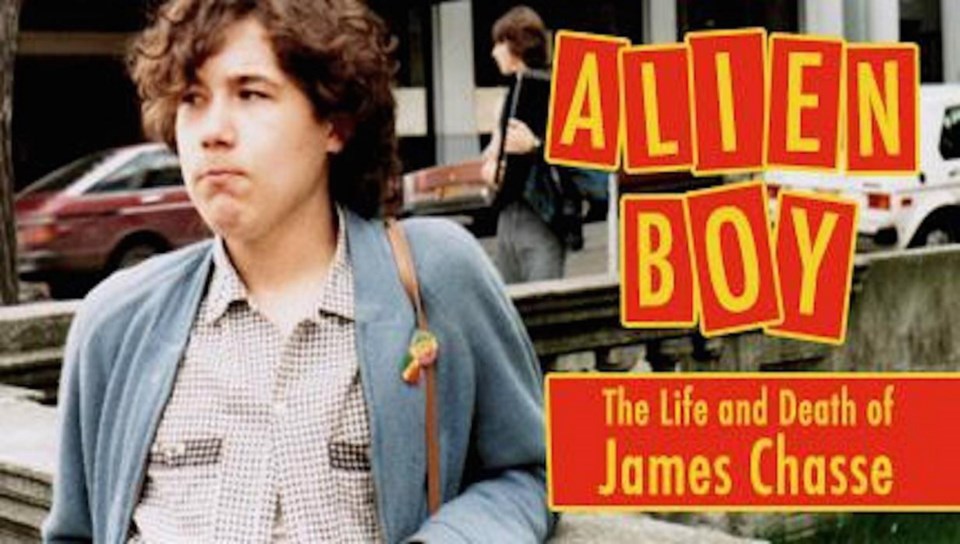It wasn’t just Brian Lindstrom’s Alien Boy: The Life and Death of James Chasse that got a thumbs-up at a public screening in Victoria this week. The Portland-based filmmaker gave a rave review of his own to Victoria police Chief Frank Elsner for having the guts to show up and face the crowd at Eric Martin Pavilion Theatre.
After all, Alien Boy paints an ugly portrait of police officers behaving badly.
Lindstrom’s heart-wrenching documentary focuses on excessive force used by the Portland Police Department through a sobering look at the death of James Chasse.
The Portland poet, artist and punk rock musician, who struggled with schizophrenia, died in custody at age 42 after being apprehended in September 2006 by police, who accused him of urinating in public.
Despite being described as neither combative nor under the influence of drugs or alcohol, Chasse was chased, beaten, tackled to the pavement and Tasered. Although Chasse broke 16 ribs, repeatedly lost consciousness and had seizures, officers initially took him to jail instead of a hospital.
“I feel very inspired by the [VicPD] chief’s openness, and the fact he would acknowledge this,” said Lindstrom, who is married to Cheryl Strayed, the author of the best-seller Wild.
Alien Boy was shown 65 times in Portland, yet the city’s police chief never attended any screenings, Lindstrom said. The only other Canadian city where it has been publicly screened was Toronto.
“It’s a shame Jim was on the street to begin with” was how a Toronto police department representative reacted after that screening, Lindstrom recalled.
“It’s heartening that the response here is so much better and it gives me hope,” Lindstrom told the Victoria crowd.
Many gasped during sequences featuring surveillance footage of Chasse’s brutal mistreatment, the denial of appropriate medical treatment and recordings of depositions by shocked eyewitnesses and contrasting testimony from the officers.
“That was a very tough film to watch,” Elsner said. “It’s hard to imagine anything that happened there being condoned at any level.”
Noting he was “just gobsmacked” by the brutality footage, Elsner said he kept hoping “that any minute they’re going to do the right thing.”
While U.S. police departments often talk about “enforcing the laws,” policing tends to be described differently in Canada, Elsner said. “If we’re just law enforcers, everything comes down to: ‘You’ve broken the law and we must chase you and capture you,’ ” he said.
“If police only look at things through those lenses, that kind of thing will happen again for sure.”
Elsner, who was accompanied by Const. Sue Hamilton of the Victoria Integrated Community Outreach Team, noted that Victoria has a huge homeless population, many of whom have mental- health and addiction problems.
“It’s not illegal to have an addiction, or a mental-health disease or to be homeless,” Elsner said.
VicPD solutions, some already implemented, include crisis-intervention and de-escalation training, sensitivity training, education on mental-health issues and modified recruitment and performance evaluation.
“One thing is to have a co-ordinated response at street level for people in crisis, so police aren’t the first on the scene,” said Elsner, who pointed to a policy resolution proposed by Esquimalt Coun. Susan Low at the Association of Vancouver Island and Coastal Communities’ annual convention.
Low’s resolution, which passed unanimously, called for the provincial government to increase funding to organizations that provide community health resources and can work with police on integrated response plans for mental-health crises.
Elsner intends to put it on the agenda for an upcoming meeting of B.C. police chiefs.
“There’s no magic pill here, but we’re going to train and equip [frontline workers] as best we can,” he said. “We have so many people who need help and there’s nobody there to help them.”
Meanwhile, maintaining integrity remains a priority, Elsner said, as does increased acknowledgement that police officers themselves aren’t immune from mental-health challenges.
“Policing is the Titanic and there is a big iceberg there, and it’s a tough boat to turn,” he said. “You’re seeing new leaders coming up who are starting to get this.”
